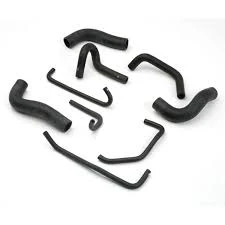petrol fuel hose
ធ្នូ . 12, 2024 10:48 Back to list
petrol fuel hose
Understanding Petrol Fuel Hoses Essential Components for Efficient Fuel Systems
The modern automotive industry is a marvel of engineering and technology. One crucial yet often overlooked component of any vehicle's fuel system is the petrol fuel hose. These hoses are essential for safely transporting fuel from the tank to the engine, making them vital for vehicle performance and safety.
What is a Petrol Fuel Hose?
A petrol fuel hose is a flexible tube designed specifically to carry fuel within a vehicle's fuel system. Typically constructed from rubber or polymer materials, these hoses are engineered to withstand the harsh conditions associated with gasoline, including high pressures and a wide temperature range. The hoses are fitted with secure connections at both ends, ensuring a tight seal to prevent leaks—an essential feature given the flammability of petrol.
Key Characteristics of Petrol Fuel Hoses
1. Material Compatibility Petrol fuel hoses are made from materials that resist degradation from gasoline and other petroleum products. Rubber hoses may contain additives to enhance their durability, while synthetic hoses may utilize materials like nitrile, which offers excellent resistance to fuel.
2. Pressure Rating The pressure rating of a fuel hose is a crucial consideration. Petrol fuel hoses must withstand the pressure generated by the fuel pump and the various components of the fuel system. Generally, a quality fuel hose will have a pressure rating that significantly exceeds the normal operating pressure to accommodate surge pressures that can occur during operation.
3. Temperature Tolerance Vehicles operate in diverse temperature environments, and petrol fuel hoses need to perform optimally across a wide range. The materials used in the construction of these hoses should maintain flexibility and integrity at both high and low temperatures.
4. Length and Diameter The size of a petrol fuel hose will vary based on its application. It's critical to use the right diameter for efficient fuel flow and to prevent unnecessary restrictions or leaks. The length of the hose must also be appropriate for its routing within the vehicle.
Installation and Maintenance
petrol fuel hose

Proper installation is vital to ensure the longevity of petrol fuel hoses. When fitting a new hose, it is essential to check for any signs of wear or damage in the surrounding components. Follow proper torque specifications for clamps to secure connections tightly without damaging the hose. It's also advisable to inspect petrol fuel hoses regularly for signs of cracks, leaks, or abrasions, especially in older vehicles.
Common Issues
One of the most common issues concerning petrol fuel hoses is deterioration over time. Factors such as exposure to heat, ozone, fuel additives, and physical abrasion can lead to cracks or leaks. When these issues occur, they not only pose a fire hazard but can also lead to reduced fuel efficiency and engine performance.
Another concern is improper routing of fuel hoses. Hoses that are twisted, pinched, or kinked can restrict fuel flow, causing the engine to run inefficiently or even stall. Ensuring that hoses are installed in a manner that allows for natural flexing during engine movement is crucial for maintaining an effective fuel system.
Upgrade and Replacement
Upgrading to high-quality petrol fuel hoses can make a significant difference in the performance and safety of a vehicle. Aftermarket options often use advanced materials and construction techniques that can improve the lifespan and reliability compared to stock hoses.
When replacing a fuel hose, it’s essential to choose the correct specifications to suit the specific make and model of the vehicle. This ensures compatibility with the fuel system and can help avoid costly mistakes that could lead to fuel system failures or accidents.
Conclusion
In conclusion, petrol fuel hoses may be small components in the grand scheme of an automotive system, but their significance cannot be overstated. They play a crucial role in maintaining fuel efficiency, ensuring vehicle safety, and facilitating peak engine performance. Regular inspection, timely replacement, and using high-quality materials are essential practices for any vehicle owner who wants to uphold the integrity of their fuel system. By understanding the importance of petrol fuel hoses, automotive enthusiasts and everyday drivers alike can ensure that their vehicles run smoothly and safely for years to come.
